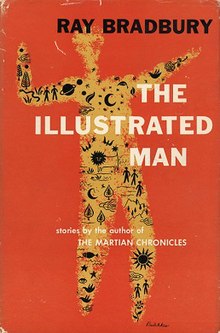 Dust jacket from the first edition. | |
| Author | Ray Bradbury |
|---|---|
| Cover artist | Butchkes |
| Language | English |
| Genre | Science fiction |
| Publisher | Doubleday & Company |
Publication date | 1951 |
| Publication place | United States |
| Media type | Print (hardback) |
| Pages | 256 |
| ISBN | 0-553-23096-4 |
The Illustrated Man is a 1951 collection of 18 science fiction short stories by American writer Ray Bradbury. A recurring theme throughout the stories is the conflict of the cold mechanics of technology and the psychology of people. It was nominated for the International Fantasy Award in 1952.[1]
The unrelated stories are tied together by the frame story of "The Illustrated Man", a vagrant former member of a carnival freak show with an extensively tattooed body whom the unnamed narrator meets. The man's tattoos, allegedly created by a time-traveling woman, are individually animated, and each tells a different tale.
All but one of the stories had been published previously elsewhere, although Bradbury revised some of the texts for the book's publication.
The book was made into the 1969 film, The Illustrated Man, starring Rod Steiger and Claire Bloom. It presents adaptations of the stories "The Veldt", "The Long Rain" and "The Last Night of the World".
Some of the stories, including "The Veldt", "The Fox and the Forest" (as "To the Future"), "Marionettes, Inc.", and "Zero Hour" were also dramatized for the 1955–1957 radio series X Minus One. "The Veldt", "The Concrete Mixer", "The Long Rain", "Zero Hour", and "Marionettes Inc." were adapted for The Ray Bradbury Theater television series. "The Fox and the Forest" was adapted by Terry Nation for the 1965 BBC television series Out of the Unknown.
- ^ "Index to SF Awards". Locusmag.com. Archived from the original on 2012-10-16.